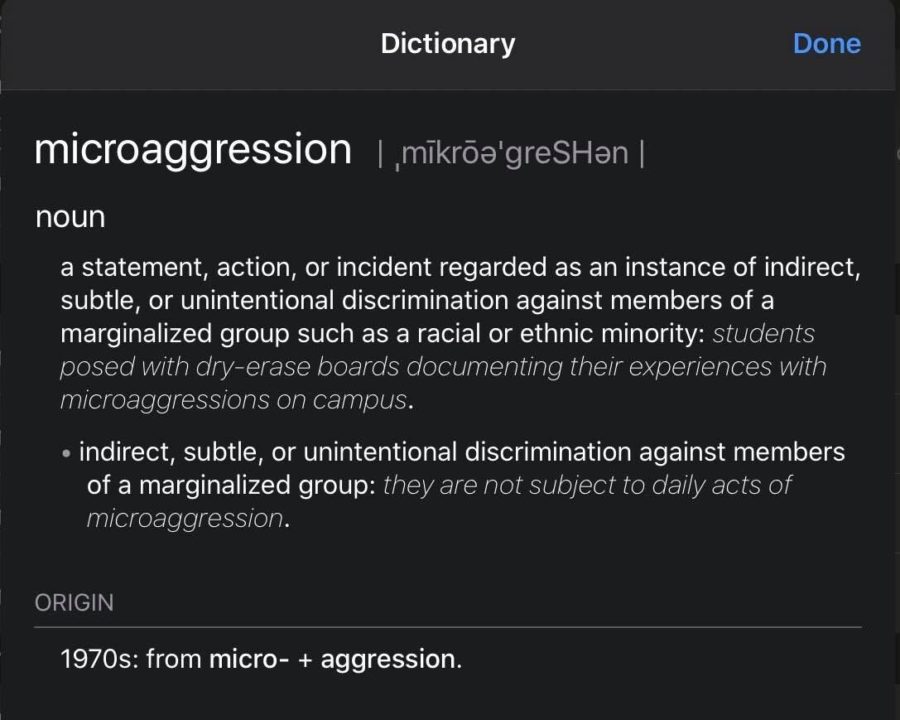Iowa State students share their experiences with microaggressions
Students from Iowa State explain what microaggressions are and how they can affect marginalized communities.
September 13, 2020
During the sociopolitical climate of today, students at Iowa State disclose their microaggression experiences, inform people on how to avoid them and express their disappointment of the school’s microaggression management.
Microaggressions are briefs, comments or actions — intentional or unintentional — laced with prejudice against marginalized groups.
According to the American Psychological Association, the term was first created by Harvard professor Chester M. Pierce in 1970 to describe insults he experienced as an African American.
The term continues to be used today, as students at Iowa State have reported experiencing microaggressions based on their race, gender, sexual orientation, nationality or sociometric status on campus.
Nyamal Gatluak, a junior in entrepreneurship, recalled an incident where she experienced microaggressions on campus. Gatluak is South Sudanese but calls Des Moines home.
“I always get the question, ‘Where are you from? No, where are you REALLY from?’” Gatluak said. “Am I not American enough to call this place home? It’s such a simple question, but I always struggle answering it because I never know what people mean by it…and it’s a form of disrespect.”
Janiely Vazquez, a sophomore in English, received the same question as Gatluak but said, many times, people aren’t aware that what they’re saying creates an uncomfortable atmosphere.
“When they ask, ‘Oh, where are you from?’, in their mind, you already look like someone who isn’t from the U.S.,” Vazquez said. “…Don’t just assume.”
She understands people are curious but don’t realize how bothersome that question is to people of color because the question itself is based on appearances.
Similar to the question of “Where are you really from?”, Harry Nguyen, a senior in management, often receives the question, “What kind of Asian are you?”
“It makes me feel uncomfortable in a way because the first thing they see is my race…now I have to talk about my race and not simply myself,” Nguyen said.
Microaggressions happen frequently and can often be unintentional, yet they carry an emotional charge to the recipients.
Somerle Rhiner, a junior in sociology, described her experience with microaggressions similar to Gatluak.
Rhiner said after many times of telling people how to pronounce her name, they continue to pronounce and spell it incorrectly. Instead, they asked her for a nickname.
“It makes me feel invalidated, yet it’s so prevalent [in society], it’s not something I can escape from,” Rhiner said.
Whether the comments were intentionally hurtful or not, these students still felt uncomfortable because of such remarks.
When asked how people can become more aware of their hurtful comments, most students agree upon becoming educated on it.
Gatluak said it could be difficult for people to realize that what they’re saying are microaggressions, but the first step is to educate oneself on these issues, acknowledge it and be willing to fix future mistakes.
“These stereotypes [of marginalized groups] have been around for so long, but to dismantle them, you need to recognize them and educate yourself,” Gatluak said.
Many students complain about Iowa State’s lack of education on microaggressions.
Iowa State offers options such as their online diversity course. However, nobody’s willing to do that on top of their school work, Gatluak said.
“[Iowa State] gives options but doesn’t create change,” she said.
Another effort on Iowa State’s part is last year’s workshop on how people of color should handle microaggressions.
Rhiner says that’s problematic because “it’s not proactive, it’s performative.”
“I understand they’re promising good, but there’s just so much more they can do,” Rhiner said. “But I feel like they only focus on their view of things…and not focusing on what students are asking.”
Iowa State does not provide much information regarding microaggressions, but they do offer a guide on how students and staff can avoid microaggressions on campus.
Many students, including Nguyen, said they didn’t even know any services at Iowa State that address microaggressions.
“[Iowa State] does good with inclusion with their multicultural students, but no, they don’t do anything about microaggressions,” Nguyen said.
However, he also said you can’t force people to educate themselves on these matters.
“People need to take the initiative and do their own part,” Nguyen said.
Many students who belong to marginalized groups agreed that the responsibility of explaining these microaggressions to other people don’t fall on them.
“People of color shouldn’t have to explain it to you; it’s not their job,” Rhiner said.

















